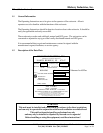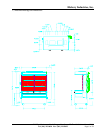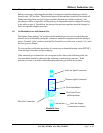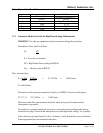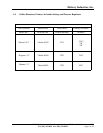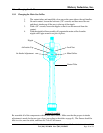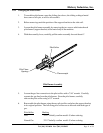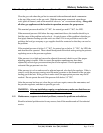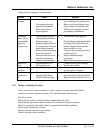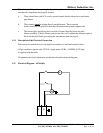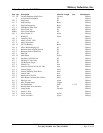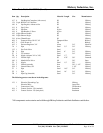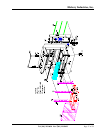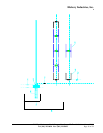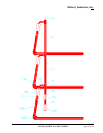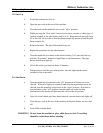
Hickory Industries, Inc.
4900 Westside Avenue, North Bergen, New Jersey 07047
Tel: [201] 223-0050 Fax: [201] 223-0950
N/45 Series Manual12/00
Page 13 of 38
Problem
Burners do
not ignite.
Pilot burner
ignites. Main
burner initially
ignites, but
then goes out.
Burners too
weak.
Burner
back-fires.
Pilot flame
does not stay
on.
Solution
a. Make sure that all gas valves are
open and that gas is reaching unit.
b. Remove and control the gas valve
at the connection (manual) or the
LPG pressure regulator. Contact
gas company or distributor.
a. Adjust thermocouple position.
b. Only the themocouple tip should be
enveloped by the pilot flame and
heated. The pilot flame must be
strong and blue in color.
c. Clean or adjust opening according
to table in page 9.
d. Tighten all thermocouple
connections.
e. Replace thermocouple (service co.).
a. Contact service or gas company.
b. Install correct orifices.
Adjust the primary air intake.
(contact service company)
a. Block off holes on the main burner
pipe directly below the pilot burner.
b. Replace thermocouple (service co.).
Cause
a. No gas flow.
b. Gas container too cold
especially with butane.
Water in gas freezes
in gas regulator.
a. Thermocouple tip is not
enveloped by pilot flame.
b. Thermocouple is not
heated enough by flame or
it is being heated along the
entire length too much.
c. Primary air intake blocked
or must be adjusted.
d. Thermocouple is loose at
one of the connections.
e. Defective thermocouple.
a. Gas pressure too low.
b. Wrong orifice size.
Too much primary air.
a. Flames on pipe burners
disrupting pilot flame.
b. Defective thermocouple.
A routine maintenance should be carried out at least once a year. Contact your local,
certified service company for maintenance.
1.12 Testing or checking for safety
After a conversion, a new installation, or after a repair, it is important that the unit be
tested to insure that it operates properly. This should include the following:
Test for gas leaks.
Check that the unit has enough clearance behind and to the sides.
Check that enough primary and secondary air is available (strong blue flames).
Check for potentially flammable objects or potential flammability problems.
Check the gas distribution systems.
Check for proper ventilation and exhaust.
Check for proper room ventilation.



